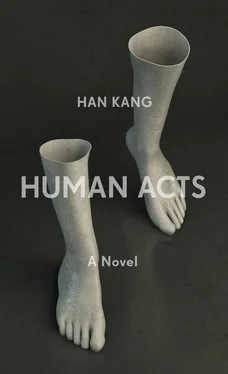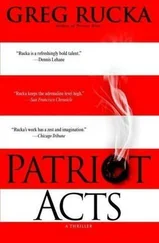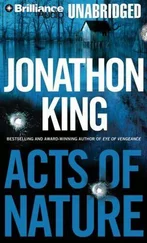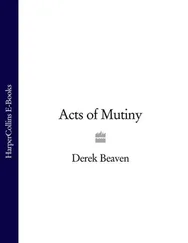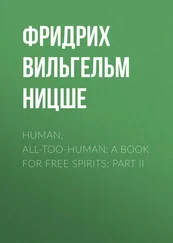Han Kang - Human Acts
Здесь есть возможность читать онлайн «Han Kang - Human Acts» весь текст электронной книги совершенно бесплатно (целиком полную версию без сокращений). В некоторых случаях можно слушать аудио, скачать через торрент в формате fb2 и присутствует краткое содержание. Год выпуска: 2016, Издательство: Portobello Books, Жанр: Современная проза, на английском языке. Описание произведения, (предисловие) а так же отзывы посетителей доступны на портале библиотеки ЛибКат.
- Название:Human Acts
- Автор:
- Издательство:Portobello Books
- Жанр:
- Год:2016
- ISBN:нет данных
- Рейтинг книги:4 / 5. Голосов: 1
-
Избранное:Добавить в избранное
- Отзывы:
-
Ваша оценка:
- 80
- 1
- 2
- 3
- 4
- 5
Human Acts: краткое содержание, описание и аннотация
Предлагаем к чтению аннотацию, описание, краткое содержание или предисловие (зависит от того, что написал сам автор книги «Human Acts»). Если вы не нашли необходимую информацию о книге — напишите в комментариях, мы постараемся отыскать её.
Human Acts
Human Acts — читать онлайн бесплатно полную книгу (весь текст) целиком
Ниже представлен текст книги, разбитый по страницам. Система сохранения места последней прочитанной страницы, позволяет с удобством читать онлайн бесплатно книгу «Human Acts», без необходимости каждый раз заново искать на чём Вы остановились. Поставьте закладку, и сможете в любой момент перейти на страницу, на которой закончили чтение.
Интервал:
Закладка:
‘Excuse me.’ A robust-looking plain-clothes policeman stops her in front of City Hall. ‘Please open your bag.’
At such moments, she knows, a part of one’s self must
be temporarily detached from the whole. One level of her conscious mind peels away, a sheet of paper folding with the ease of habit along an oft-used crease. She opens her bag and displays the contents — a hand towel, acacia gum, a pencil case, the bound proof which the publisher’s niece brought to the office the day before, Vaseline for chapped lips, a notebook, a purse — without the slightest flicker of shame.
‘What is your business here?’
‘I have an appointment at the censor’s office. I work for a publisher.’ She looks the policeman directly in the eye.
She produces her resident’s card when instructed to do so. She looks on, unmoving, as he rummages through the pouch containing her sanitary towels. Just like what had happened two days ago, in the interrogation room at the police station. Just like that sleet-streaked April four years ago, after her cramming had finally paid off, and she’d passed the university entrance exams second time round and moved up to Seoul from Gwangju.
She’d been eating lunch late in the university cafeteria when the glass door banged open and a crowd of students raced in. The hand clutching her spoon had frozen as she stared blankly at the sight of plain-clothes policemen pursuing them through the cafeteria, roaring threats and brandishing clubs. One of their number seemed especially worked up — skidding to a halt in front of a chubby boy whose mouth was hanging open above his plate of curry and rice, he snatched up a chair and swung it over the table. The burst of blood from the boy’s forehead gushed down over his nose and mouth. The spoon dropped from Eun-sook’s fingers. Unthinkingly bending down to pick it up, her hand closed upon a flyer that had fallen to the floor. The thick font swam in front of her eyes. DOWN WITH THE BUTCHER CHUN DOO-HWAN. Just then, a rough hand grabbed hold of her long hair. It tore the paper from her grasp and dragged her off her chair.
DOWN WITH THE BUTCHER CHUN DOO-HWAN.
Those words feel seared onto her chest as she gazes up now at the photograph of the president hung on the plaster wall. How is it, she wonders, that a face can so effectively conceal what lies behind it? How is not indelibly marked by such callousness, brutality, murderousness? Perched awkwardly on a stool beneath the window, she tears at a hangnail. The room is warm, but she can’t remove her scarf; the brand on her cheek is flushed from the radiator’s heat.
The man behind the counter wears the uniform of the Defence Security Command. When he calls the name of her publisher, Eun-sook goes up to the counter and hands over the book proof. She asks for the manuscript proofs to be returned, which she gave in for inspection two weeks ago.
‘Please wait here.’
Beneath the murderer’s framed photograph is a door with frosted glass. Behind that door, she knows, the censors are busy with their work. She pictures the scene: middle-aged inspectors sporting army uniforms, their faces entirely unfamiliar, poring over the open books covering the table. The counter manager opens the door just as wide as he needs to angle his body through, the movement swift and practised.
Barely three minutes have gone by before he returns to his post.
‘Sign here, please.’ When he pushes the ledger towards her, she hesitates. A single glance had been sufficient to see that there was something strange about the manuscript proof he has just put down on the counter. ‘Sign, please.’
Eun-sook signs her name, and is given the manuscript.
Any further exchange of words would be pointless. The censors’ task has been carried out, and now Eun-sook holds the result in her hands.
She turns and walks away from the counter, her steps slow and almost stumbling. She comes to a halt by the row of benches, and turns the pages of the manuscript. Having spent a full month typing it up, comparing it against the original and completing the third printer’s proof, she knows its content practically by heart. Now at the final stage before publication, it only remains to be properly printed.
Her initial impression is that the pages have been burned. They’ve been thrown onto a fire and left to blacken, reduced to little more than a lump of coal.
Submitting the manuscript proofs to the censor’s office, then calling back on the appointed day — she’s been through this same process every month since starting work at the publisher’s. After checking to see which sections of the text had been crossed out with a black line — usually three or four, a dozen at the most — she would return to the office feeling somewhat deflated, and send the corrected proofs off to the printers.
But this time is different. More than half of the sentences in the ten-page introduction have been scored through. In the thirty or so pages following, this percentage rises so that the vast majority of sentences have a line through them. From around the fiftieth page onwards, perhaps because drawing a line had become too labour-intensive, entire pages have been blacked out, presumably using an ink roller. These saturated pages have left the manuscript bloated and distended, water-logged flotsam washed up on some beach.
Handling it as though it really were charcoal, friable and likely to crumble, she slipped this alien object into her bag. Its leaden weight was entirely incommensurate with its actual substance. She cannot remember how she made it out of that office, how she walked down the corridor and out through the main doors, where a plain-clothes policeman was standing guard.
There is no way, now, that this collection of plays can be published. All their efforts had been in vain, right from the start.
Her mind fumbles through those few, scattered sentences that were spared from the introduction.
After you were lost to us, all our hours declined into evening.
Evening are our streets and our houses.
In this half-light that no longer darkens nor lightens, we eat, and walk, and sleep.
She recalls sentences roughly darned and patched, places where the forms of words can just about be made out in paragraphs which had been otherwise expunged. You. I. That. Perhaps. Precisely. Everything. You. Why. Gaze. Your eyes. Near and far. That. Vividly. Now. A little more. Vaguely. Why did you. Remember? Gasping for breath in these interstices, tiny islands among language charred out of existence. How can there be water coming out of the fountain? What can we possibly be celebrating?
She turns her back on the black bronze statue of the general with his sword, and walks on without pausing. Her breathing constricted by the scarf, pain throbbing dully beneath the reddened skin of her exposed cheekbone, she walks on.
Slap Four
The editor Kim Eun-sook had sat there and waited for the man’s hand. No, she had waited for him to stop. But really she hadn’t been waiting for anything. She was simply struck in the face. The man beat her; she was beaten. And that, now, is what she has to forget. Today is the day for forgetting the fourth slap.
Just outside the office, at the end of the corridor, she turns on the tap at the washbasin and holds her hands under the cold water. Her wet fingers smooth her long hair, which curls without the need for a perm, and after she has succeeded in neatening it a little she ties it up with a black rubber band.
She doesn’t put on any make-up, just Vaseline for her chapped lips. Powdering one’s face to a milky whiteness, spritzing on perfume, slipping feet into high-heeled shoes; these are all things that other women do, but not she. Today is a Saturday, meaning her working day finishes at 1 p.m., but she has no boyfriend to eat lunch with. During her brief time at university, she made no friends whom she could now arrange to see. Instead, she will do as she always does, which is to return quietly to her rented room. She will soak cold rice in warm water to soften it, eat, then go to sleep. While she sleeps she will forget the fourth slap.
Читать дальшеИнтервал:
Закладка:
Похожие книги на «Human Acts»
Представляем Вашему вниманию похожие книги на «Human Acts» списком для выбора. Мы отобрали схожую по названию и смыслу литературу в надежде предоставить читателям больше вариантов отыскать новые, интересные, ещё непрочитанные произведения.
Обсуждение, отзывы о книге «Human Acts» и просто собственные мнения читателей. Оставьте ваши комментарии, напишите, что Вы думаете о произведении, его смысле или главных героях. Укажите что конкретно понравилось, а что нет, и почему Вы так считаете.
